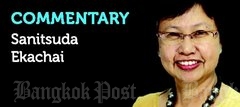Forty-two years ago today, the kids did what their parents never dreamed of doing. Fired up by youthful courage and idealism, they led the popular uprising that finally overthrew the "tyrant trio", ending the country's three decades of military oppression.
I was a first-year student then. Like the rest of the country, I believed the reign of fear and terror was finally behind us. How wrong we were.

It was at the height of the Cold War. Vietnam, Cambodia and Laos fell to communism two years after the uprising. I still remember vividly the widespread fear in the country that Thailand would soon follow under the US domino theory. The fear fuelled right-wing propaganda while public confidence in the students' movement weakened as it grew more radicalised.
The year I graduated saw one of the country's darkest chapters - the Oct 6 Thammasat University massacre. It showed what atrocity the powers-that-be are capable of to protect their "turf".
Several coups and civilian governments later, are we back at square one?
In 1973, the country was united in its anger and hatred against military dictatorship. After the 1992 bloodshed, the bruised military returned to the barracks. The 1997 charter emerged from a vibrant civil society to strengthen checks and balances mechanisms in national politics and to give more say to communities in natural resources management. Most believed coups would never happen in Thailand again.
Again, how wrong we were.
Public unity against military coups is also no more.
When Gen Prayut Chan-o-cha staged the coup in May last year, what disturbed me more than the coup itself was the immense support it received from a large segment in society, especially the privileged classes. It raises the question of whether coups are the disease or the symptom of a deeper problem in our society.
It also amazed me that many activists who once opposed the military and coups d'etat in the 1970s and 1990s have now opted to welcome the Prayut regime with open arms.
Many blame it on Thaksin Shinawatra's winner-takes-all politics that offended the status quo and old money, his "parliamentary dictatorship", and the deep red-yellow divide. Who can argue with that? But is that all there is to it?
Since many political figures nowadays, be they politicians or social activists, were once involved in the pro-democracy movement in the '70s, I suspect their political differences may stem from different views on how to effect change.
One group believe you must have power in order to change things. That's why they joined Thaksin's political machine. Others believed real change must start at the village level. Thaksin's aggressive push for myriad megaprojects that destroy locals' livelihoods pushed this group to side with his political enemies.
While the former has become part of the heartless system that punishes the poor, the latter must have realised that putting a stop to the "Thaksin regime" does not mean the destructive projects will be put on hold.
On the contrary, the military regime has not wasted any time. Big dams are back on the agenda. So are the deep-sea port projects that will hurt marine ecology beyond repair. Mining will be soon allowed in all parts of the country, including pristine forests. The poor will be evicted to make way for special economic zones. The old charms of the Chao Phraya riverside in the city will be forever destroyed. Face armed soldiers if you dare protest, as the villagers against gold mining and fracking have found.
It is clear. Whoever is in power, people on the ground and the environment continue to suffer.
This is because all governments -- civilian and military -- subscribe to the same development ideology of siphoning rural resources to feed urban wealth and economic growth figures.
It was strongman Sarit Thanarat, notorious for his harsh rule, who started this development ideology here. He strengthened officialdom and used it to carry out the task. In the process, state agencies wrote top-down laws to make them own the resources and expand organisational powers. Subsequent governments dutifully followed as the authoritarian bureaucracy kept growing.
An authoritarian officialdom is not the only obstacle to change. Equally important if not more is a deeply militaristic and feudal culture.
That's why four decades after the historic uprising, we are still stuck in the vicious coup cycle.
Sanitsuda Ekachai is editorial pages editor, Bangkok Post.
